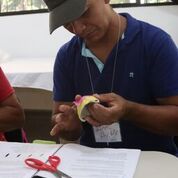
“God will make a way where there seems to be no way.”-Don Moen
In late November, I was privileged to walk alongside of my friends at AMOS Health and Hope in Nicaragua providing a full week of trainings in psychosocial First Aid using the arts for self and staff care. AMOS works towards improving integral health and well-being for over 69,000 people across Nicaragua. Integral health– physical, mental, socioeconomic, emotional, and spiritual – involve communities themselves. Over the years, AMOS has trained a network of 630 community health workers to bring health closer to the people.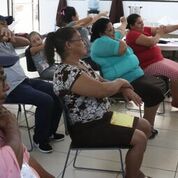
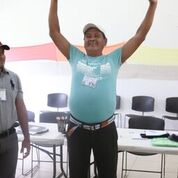
When we started our week of First Aid Arts trainings at AMOS, we were all bone weary tired. I had missed flight connections due to weather and arriving late with little time to rest and prepare for our early start on Monday. I was frustrated by many inconveniences and situations outside of my control. I found myself needing to practice many of the coping skills I would be teaching soon. My struggles, though valid, diminished once we began sharing our journey to the workshop stories. Listening to Petronilo’s account gave me pause. He, along with many other community health promoters, traveled many hours over precarious terrain by horseback and crowded buses to arrive. They too, were physically and emotionally tired.
This year, with the ongoing humanitarian crisis in Nicaragua, people face many obstacles to getting the health care. Hundreds of thousands of people have lost their jobs and have no means to provide for their families’ basic needs, making it harder for them to access emergency transportation, provide enough food to their children, and get important medicines. While other national and international organizations have cut back services or left Nicaragua, AMOS health promoters and staff are working harder than ever to continue their mission during this difficult time and that includes supporting mental health. Individual and community resilience is strong in Nicaragua, but the need for support and care for these who care so much is vital as well. Because the road is so long, dangerous and difficult to navigate at times, energies wane and spirits sink. 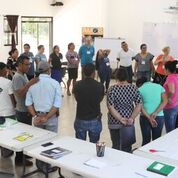
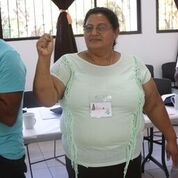
Recognizing the debilitating and damaging effects of ongoing economic, political and social unrest on our bodies, minds, souls and relationships can help us to respond in creative and life-sustaining ways. Art allows us to imagine and to express. Without having to depend only on words, art provides a new road to explore our feelings, thoughts and dreams. Through music, movement, making and mirroring, we can connect and repair the broken relationships and memories caused by toxic stress, political and social uncertainty and insecurity. Art helps us to rebuild confidence in ourselves and trust in each other. By doing art together, important links for healing can be made and strengthened. By imagining what could be instead of getting stuck where we are, we are able to move beyond the vortex of violence and trauma. Expressing the inexpressible through images, movement, sounds or symbols allows us to make sense out of the senselessness we feel at times. When we can heal the internal wounds, our social groups will be healthier as well.
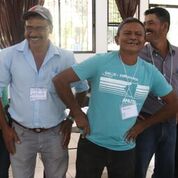
Caring for our own health and well-being is paramount so that we can care well for others. Self-care is also a discipline because it’s not something you do once in a while when the world gets crazy. It’s what you do every day, every week, month in and month out. It’s taking care of yourself in a way that doesn’t require you to “indulge” in order to restore balance. It’s making the commitment to stay healthy and balanced as a regular practice. This regular practice is like widening a pathway by walking over it a number of times. Ironically when you truly care for yourself, exercising all the discipline that requires, you are actually in a much stronger place to give of yourself to those around you. Those who take care of themselves have the energy to take care of others joyfully because that caregiving doesn’t come at their own expense. And those who take care of themselves also have the energy to work with meaning and purpose toward a worthy goal. Which means they are also the people most likely to make the world a better place for all of us. AMOS health promoters, staff and key leadership all practiced concentrated self and community care and the results were notable. Laughter, relaxation, focus, and engagement replaced worry, tension, distraction and isolation.
Many of the promoters use horses as their only means of transportation to reach the isolated communities they serve. At the beginning of our First Aid Arts’ Responder Training Juan doubted he had any artistic ability, but as he finished his colorfully decorated clay horse and rider to express his own commitment to service and to health for all, he realized that he could do something he originally thought he couldn’t. By engaging in art-based activities, Juan and the other AMOS leaders reconnected with their bodies through simple breathing and stretching exercises, their minds through experiential educational games, their spirits through singing and movement, and their social support network by sharing their struggles and their strengths with one
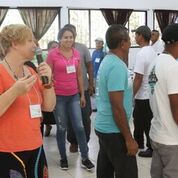 another. Creating courageous communities like we did through our healing arts workshops at AMOS, gives us the support to face challenges. Sometimes our stories get in our way, and we need people who are doing similar work to help us see where we’re getting
another. Creating courageous communities like we did through our healing arts workshops at AMOS, gives us the support to face challenges. Sometimes our stories get in our way, and we need people who are doing similar work to help us see where we’re getting
stuck or what we’re truly capable of. There are simply communities—sometimes of just one other person—who make change believable. Making change is simply easier when we have support. These change-makers had the opportunity to renew their spirits and their commitment to service in times of crisis and beyond because of your support. We widen the road by walking it together. It is now a little easier for all of us.
Thanks for your part in creating new pathways for health and hope and the company you provide by walking with me along the way. Yours along the Way,
Mylinda